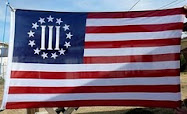Wednesday, February 06, 2008
Why the Union was Wrong for the right reason and the Confederacy was Right for the wrong reason
The roots of the Republican Party's power and strength lies in the self-justified use of violence with an "ends justify the means" mentality. Their short term gains have never outweighed the long term misery and suffering that their hypocrisy imposes upon the survivors. They still have not learned from history that if you repress people they resent it and will find ways to fight back. I do not support CATO's neo-libertarian pro-war aristocracy. However, I do like much of Jim Powell's writings. If he keeps this up he won't last long at CATO. - Mit
Was the Civil War a Terrible Mistake?
by Jim Powell
During Dr. Ron Paul's recent appearance on Face The Nation, he suggested that the "Civil War" was a mistake, and he has been criticized for saying that. The topic was a minor part of the interview, and he didn't have time to present much of a case, but fascinating questions were raised. How else would American slaves have gained their freedom if the Civil War hadn't forced the issue? How could important social reforms of any kind be achieved against stubborn opposition?
Most Americans know only about the four main anti-slavery strategies pursued in the United States: (1) abolitionist campaigns that involved publications and speaking tours, organized by William Lloyd Garrison and others; (2) slave rebellions, like the one incited by Nat Turner; (3) the Underground Railroad, in which runaway slaves like Harriet Tubman and Frederick Douglass, supported by Quakers and others, helped many more slaves escape to freedom; (4) and war which became the most important strategy because of its disastrous short-term and long-term consequences.
MORE HERE (Warning: not for the feeble minded - could increase intelligence)
Was the Civil War a Terrible Mistake?
by Jim Powell
During Dr. Ron Paul's recent appearance on Face The Nation, he suggested that the "Civil War" was a mistake, and he has been criticized for saying that. The topic was a minor part of the interview, and he didn't have time to present much of a case, but fascinating questions were raised. How else would American slaves have gained their freedom if the Civil War hadn't forced the issue? How could important social reforms of any kind be achieved against stubborn opposition?
Most Americans know only about the four main anti-slavery strategies pursued in the United States: (1) abolitionist campaigns that involved publications and speaking tours, organized by William Lloyd Garrison and others; (2) slave rebellions, like the one incited by Nat Turner; (3) the Underground Railroad, in which runaway slaves like Harriet Tubman and Frederick Douglass, supported by Quakers and others, helped many more slaves escape to freedom; (4) and war which became the most important strategy because of its disastrous short-term and long-term consequences.
MORE HERE (Warning: not for the feeble minded - could increase intelligence)
























